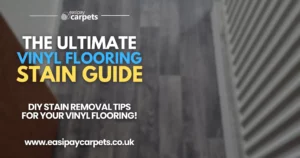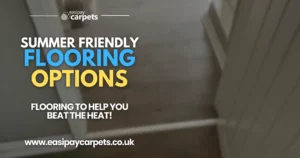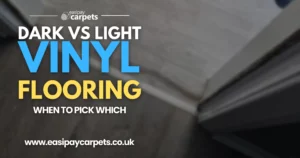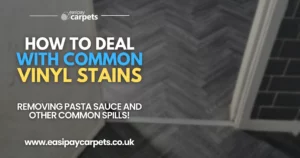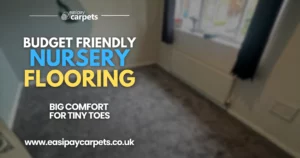
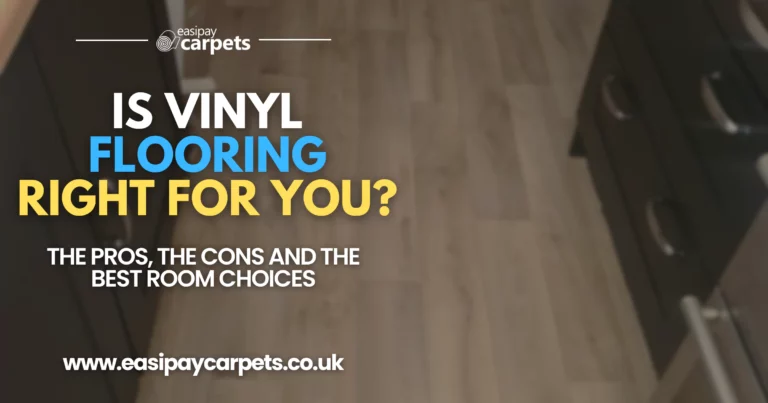
Should You Choose Vinyl Flooring? Where It Works Best and Where It Doesn’t
Is Vinyl Flooring a Good Option?
Vinyl flooring has become a popular choice for homeowners looking for a cost-effective, stylish, and durable flooring solution. But is it the right choice for every room? While vinyl sheet flooring has many advantages, it also comes with some limitations that may make it unsuitable for certain spaces.
In this guide, we’ll explore the strengths and weaknesses of vinyl flooring and help you determine where it’s best suited in your home.
The Strengths of Vinyl Sheet Flooring
Vinyl flooring is known for its affordability, resilience, and versatility. Here are the key benefits that make it a great option for many homeowners:
1. Water Resistance
One of vinyl’s biggest advantages is its resistance to water. Vinyl sheet flooring is completely waterproof, making it ideal for areas where spills or moisture are common, such as kitchens, bathrooms, and laundry rooms.
2. Durability
Vinyl sheet flooring is designed to withstand heavy foot traffic, scratches, and everyday wear and tear. It’s a great choice for busy households, especially those with children or pets.
3. Easy Maintenance
Keeping vinyl floors clean is simple—regular sweeping and occasional mopping with a damp mop is all it takes. There’s no need for waxing or polishing, making it a low-maintenance option.
4. Comfort and Warmth
Unlike tile or stone, vinyl has a softer surface that provides underfoot comfort. It doesn’t get as cold as hard flooring materials, making it a more comfortable choice in colder months.
5. Affordability
Vinyl is one of the most budget-friendly flooring options available, offering the look of more expensive materials like wood or tile at a fraction of the cost.
6. Quick and Easy Installation
Sheet vinyl is available in large rolls, allowing for seamless installation with fewer joints or gaps. It can be installed over most existing floors, reducing the need for extensive preparation.
7. Variety of Styles and Designs
Vinyl flooring comes in a wide range of colours, patterns, and textures, allowing you to mimic the appearance of wood, stone, or tile while benefiting from vinyl’s practicality.
The Weaknesses of Vinyl Sheet Flooring
While vinyl has many strengths, it also has some drawbacks to consider:
1. Susceptible to Damage from Sharp Objects
While durable, vinyl is not indestructible. Sharp objects, such as dropped knives or furniture with rough edges, can puncture or tear the surface.
2. Can Be Difficult to Repair
Unlike vinyl planks or tiles, sheet vinyl cannot be spot-repaired as easily. If it gets damaged, you may need to replace an entire section or the whole sheet.
3. May Fade Over Time
Exposure to direct sunlight can cause vinyl flooring to fade, especially in rooms with large windows. UV-resistant options are available, but prolonged sun exposure should be considered.
4. Not as High-End as Other Flooring Options
While vinyl can mimic the look of wood or stone, it doesn’t have the same premium feel. In high-end spaces, it may not provide the luxurious appearance of genuine hardwood or tile.
5. Can Show Indentations
Heavy furniture or appliances can leave indentations in vinyl flooring, especially if left in place for long periods without protective pads.
6. Not Ideal for High Heat Areas
Vinyl can warp or become damaged when exposed to extreme heat. It’s not recommended for areas with fireplaces, underfloor heating systems, or direct sunlight for extended periods.
Which Rooms Benefit from Vinyl Flooring?
Vinyl flooring is an excellent choice for many areas in the home, particularly those that require water resistance, durability, and easy maintenance.
Best Rooms for Vinyl Flooring:
✅ Kitchens – Vinyl’s water resistance and easy cleaning make it perfect for spills and high traffic.
✅ Bathrooms – 100% waterproof and comfortable underfoot, vinyl is ideal for moisture-prone spaces.
✅ Laundry Rooms – Resists water leaks and is easy to clean, making it perfect for utility spaces.
✅ Entryways & Hallways – Durable enough to handle foot traffic while remaining easy to maintain.
✅ Children’s Playrooms – Soft, warm, and forgiving against spills and falls.
Where Vinyl Flooring Is Not Recommended
While vinyl flooring is versatile, it’s not the best choice for every room.
🚫 Living Rooms & Bedrooms in Luxury Homes – If you’re aiming for a high-end look, hardwood or carpet may be a better option.
🚫 Rooms with Heavy Furniture – Furniture legs can leave indentations in vinyl over time, making it less ideal for spaces with large sofas or wardrobes.
🚫 Direct Sunlight Areas (e.g., Sunrooms) – Without UV protection, vinyl can fade and become brittle in sun-exposed rooms.
🚫 Garages or Outdoor Spaces – Vinyl is not designed for exposure to extreme temperatures or heavy-duty wear.
Conclusion: Is Vinyl Flooring a Good Option?
Yes, vinyl flooring is an excellent option for many rooms, offering water resistance, durability, affordability, and a variety of stylish designs. It’s perfect for kitchens, bathrooms, and high-traffic areas where easy maintenance is key. However, it’s not the best choice for luxury spaces, high-heat areas, or rooms with heavy furniture that could cause indentations.
By weighing the pros and cons, you can decide whether vinyl flooring is the right choice for your home and lifestyle.
Are you on the hunt for new flooring? With Easipay Carpets you can get the flooring of your dreams from as little as £10 per week, completely interest free! We offer Carpets, Vinyl and Laminate flooring with free underlay, door bars, carpet grippers and beading wherever needed on payment plans that spread the cost of the flooring into smaller, more manageable payments. Find out more at the button below!
Still Got Questions? Here's 10 FAQs!
Yes, vinyl is highly durable and can last for many years with proper care.
In some cases, underlay can improve comfort and soundproofing, but it depends on the subfloor and type of vinyl.
Vinyl is fully waterproof, while laminate is only water-resistant. However, laminate may feel more rigid underfoot.
Yes, sheet vinyl can often be laid over tile, wood, or concrete if the surface is smooth and even.
High-quality vinyl flooring can mimic wood or stone realistically, but lower-end options may not have the same effect.
Sweep regularly, mop with a damp (not soaking) cloth, and avoid harsh chemicals.
Yes, but many homeowners prefer carpet or wood for added warmth and comfort.
Yes, prolonged exposure to sunlight can cause fading. UV-resistant options help, but curtains or blinds are recommended.
Yes, vinyl is pet-friendly, as it’s scratch-resistant and easy to clean.
While durable and attractive, vinyl doesn’t add as much value as hardwood or high-end tile.
